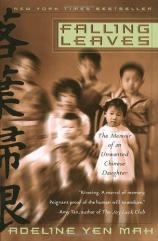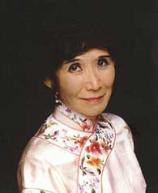Reading Group Guide
Discussion Questions
Falling Leaves

1. The basis for the book's title is the Chinese aphorism "falling leaves return to their roots." Why do you think Adeline Yen Mah chose this title? What does it mean in the context of her story?
2. Adeline Yen Mah begins her story with the reading of her father's will. Why do you think she chose this point in time to start her story? How does it set the tone for the book?
3. The author consistently gives the Chinese character, the phonetic spelling, and the English translation when using Chinese phrases. Why do you think she does this? What does it say about her, and how does it affect you?
4. Overall how would you characterize the author's life in China? Was there any happiness for her? What strategies does she use to cope with the situation and who aided her in those efforts? How would you have reacted in similar circumstances?
5. Discuss the social hierarchy of the Yen household. How did Adeline fit in? How about Ye Ye and Aunt Baba?
6. Of the many instances of cruelty that Adeline faced as a child, which ones affected you most strongly? Why?
7. How would you characterize the author's relationship with her Aunt Baba? How about with her grandfather Ye Ye?
8. How did the author's life change once she moved to England? What factors motivated this change? Why was medical school such an appropriate place for her?
9. How did the author change during her stay in Britain? How is she different? How is she the same? How does this affect her career path? How does it affect her relationship with her father and stepmother?
10. During her time in America the author's relationship with her parents and her siblings changes. Discuss these changes and what brought them about.
11. Why do you think the author became involved with Karl and Byron? Why do these relationships turn out the way they do? What about her relationship with Bob? Compare and contrast them.
12. Throughout the story Adeline comes across as a remarkable individual. She is possessed of remarkable strength, resilience, and compassion. Is there any precedent for this in her family?
13. Despite the difficulties of her childhood and the lack of emotional support from her parents, the author manages to succeed and ultimately leads a happy life. How is she able to achieve this despite her childhood emotional deprivation?
14. There are a number of funerals in the book, notably Ye Ye's, Father's, and Niang's. Discuss how the members of the family react to them. How are they different? How are they similar?
15. In the end, everyone becomes powerless in the face of Niang: the children, Aunt Baba, Ye Ye, even the author's father. Why is this? Even after her death she still is trying to manipulate the children. To what degree is she victorious? To what degree does she fail and why?
16. What does the author learn after Niang's death: about her stepmother, about her siblings (particularly Lydia and James), and about herself? What is your final impression of Niang and of her children? How do you think they came to be this way?
17. The author subtitles the book, "The Memoir of an Unwanted Chinese Daughter." How are the events portrayed influenced by Chinese society and customs? To what degree is this account of an abusive childhood universal? Would the events be different if they were to occur in another society? If so, how?
18. What is the significance of the fairy tale told to the author by Aunt Baba on the aunt's deathbed? Compare the story to Cinderella. In the end, what do we learn about Aunt Baba's role in Adeline's life and about her attitudes toward her niece?
19. The author has said, "I read somewhere that an unhappy childhood is a writer's whole capital. If that is so, then I am rich indeed." Memoirs such as Angela's Ashes and The Liar's Club have centered on unhappy childhoods. In your opinion, what is the reason for this genre's recent popularity with readers? How have these memoirs influenced modern storytelling? In what ways do these stories inspire writers and readers alike?
Falling Leaves
- Publication Date: April 6, 1999
- Paperback: 278 pages
- Publisher: Broadway
- ISBN-10: 0767903579
- ISBN-13: 9780767903578








